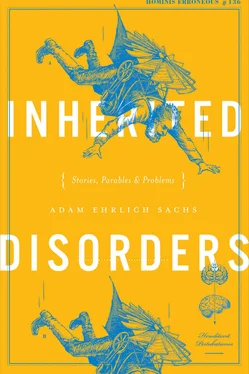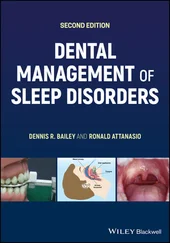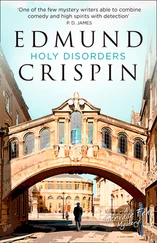All of his father’s assets, accumulated laboriously over the course of a lifetime, the press release concludes, will therefore be spent “all at once” on the study of worms entering the human body in three different places: the feet, the eyes, and the finger webbings.
While outwardly appreciative, the public health community was, needless to say, uniformly unnerved by the announcement. Many researchers, reluctant to involve themselves in a relationship they clearly did not understand, diplomatically declined the son’s money. He, however, has insisted.
…………………….
After forty years of arduous, isolated, often maddening scientific labor, a Slovenian physicist determined that the digit in the seventh decimal place of a certain fundamental physical constant, which his father had discovered and determined to six decimal places, and which was engraved to six decimal places on his father’s gravestone, was a 9. He made a pilgrimage to his father’s grave — located not in Ljubljana but in Vienna — and in a state of self-described “euphoria” attempted to chisel, with amateur instruments, under cover of darkness, a 9 at the end of his father’s constant, in the seventh decimal place. But he managed only to crack the gravestone in two, and Vienna police arrested him on charges of vandalism. They simply could not understand that he wasn’t trying to destroy his father’s gravestone but to make it, as he said, “more precise.” (As it happens, a team of South Korean physicists announced this week that the number in the seventh decimal place of the constant is not a 9 but a 4.)
…………………….
The lives of two sons had been dominated by the rivalry between their fathers, historians of the Holocaust, one of whom supported top-down explanations, and the other of whom advocated a bottom-up approach. Though one son, like his father, emphasized Hitler and Himmler, while the other son, like his father, stressed the complicity of the rank and file, they were similarly subsumed into their father’s rivalry and had failed in almost identical ways to establish their own lives.
Finally, at forty, they conspired to send their fathers to the same retirement home, and specifically requested that the top-down historian be given a room just beneath the bottom-up historian.
The subtle irony of this retribution was sadly short-lived. Three weeks after the Holocaust historians had moved in, the home — later found to have violated countless building codes — suddenly collapsed, and the top-down historian’s head was crushed by the bottom-up historian’s bathtub. The bottom-up historian survived and is still with us. This has introduced an interesting asymmetry into the once symmetric situations of the two sons; it will be instructive to see if one or the other of them is able to salvage the second half of his life.
…………………….
The oldest son of a rich family — Jewish, incidentally — was being groomed to take over the family business, an industrial conglomerate. He learned from his father the vernacular, the social customs, and the substance, such as it is, of the business, and soon enough he could calculate the net present value of this or that investment, drink credibly with Korean shareholders, and speak with fluency and conviction the corporate patois of his forebears.
But the son did not have the physical presence of his father, did not have his monumentality, his height, his shoulders, his belly, all of which seemed indispensable to the position of chairman. And without these qualities (he began to fear) all the grooming in the world would come to nothing, he would let down his rich culturally Jewish family, and the diversified industrial conglomerate would collapse.
One afternoon, however, on the eve of the annual shareholders’ meeting, his father summoned him to his office, instructed him to close the door, and, tugging upon a zipper elegantly concealed behind his right ear, actually began unzipping his entire body, revealing inside of it a small sentimental faultfinding octogenarian.
“Here, put this on,” said the old man, handing the son the father’s big, charismatic, broad-shouldered body. “No, no, not like that, not like that. Like this .” He showed him how to step firmly into the father’s foot and, working upward from ankle to knee, negotiating ligament and bone, how to secure the father’s calf muscles around his own. Then he showed him how to wrap himself in the father’s skin, proceeding bit by bit, keeping it uniform and taut, like tucking in a sheet.
“Are you sure,” the son asked, referring to the body he’d now assumed up to the knees, “that you don’t need this anymore?”
And the old man said, “I’ll be fine, I’ll be fine. Why don’t you worry more about installing yourself in the pelvic girdle.”
Indeed, that step was a little tricky, requiring some complicated contortions. The father did not make things any easier by intermittently yelping, “Be careful of the penis!” while spastically shooting out a withered arm to rescue that organ from whatever peril it seemed to him to be in. But once the son had mounted himself in his father’s pelvis the process went a lot faster. He reached deep into his father’s arms and shrugged on his father’s torso, no differently than he would a winter coat. Then it was really just a matter of tightly swaddling his neck in his father’s neck, donning his father’s head like a helmet, stretching his father’s face over the jawbone and around the back of the skull, and zipping it all up to the ear.
“Whoa,” said the old man. “Who’s this handsome guy?”
“Ha, ha,” said the son.
“Who’s this handsome guy, and what did he do with my son?”
“Very funny. I look okay?”
“Pretty spiffy. Let me look at you.” The old man smoothed out a bulge in the son’s spinal column and then reached a fist down the son’s throat and flicked his uvula a couple of times with his middle finger. “Pretty damn spiffy, is what I think.”
“It’s a really nice body,” the son said. “Thank you.”
The sentimental octogenarian waved away the thanks, though the son thought he spotted tears welling in his eyes.
“Keep it clean,” the old man said gruffly.
“I will.”
“Be careful of the penis. Doorknobs, drawers, knives, car doors. Rotors.”
“Of course.”
The next morning the son, wearing his father’s body, was introduced as the new chairman. The company’s shareholders seemed to be reassured by his familiar presence, and the markets hardly registered the change. The stock price, which had been expected to fall slightly, in fact rose slightly, and the long-term outlook for the diversified industrial conglomerate remains the same as before.
…………………….
On the brink of death an old man summoned his son and asked him to take care, after he was gone, of a few unfinished things.
Of course, said the son, trying not to sob. Anything!
With a tremulous finger the father pointed to a row of books on a shelf across the room, the six volumes of Edward Gibbon’s History of the Decline and Fall of the Roman Empire . He’d read five of them, he said, but he had not had time to read the sixth. Life is astoundingly short! You can’t imagine the regret you feel at the end of it. Please, he said, clutching his son’s hand, finish it for me.
Of course! cried his son. I will, I promise!
Then the father handed his son a sheet of paper on which the words “The atom consists of” were typed at the top. He had always wanted to write a physical treatise, he said, and had even begun writing it — he pointed to the words “The atom consists of”—but life had interfered, and he had never completed it. Write the physical treatise, he said.
Читать дальше












